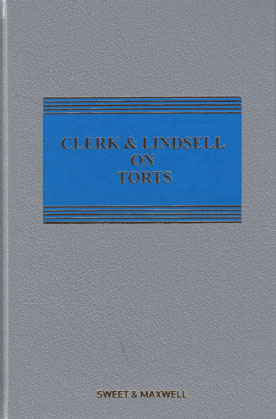We are now closed for the Christmas and New Year period, returning on Monday 5th January 2026. Orders placed during this time will be processed upon our return on 5th January.

Clerk & Lindsell on Torts, part of the Common Law Library series, is one of our flagship titles. It is the definitive work and market leader in this area of law; it offers the most comprehensive coverage of the subject, providing the end user with indispensable access to current, frequent and unrivalled authoritative information on all aspects of tort law. An essential reference tool, Clerk & Lindsell is widely referred to by practitioners and cited the judiciary.
The new edition brings the work completely up-to-date with the changes in the law since the last edition in 2014, including those arising from the Defamation Act 2013 and the developments in all of the key case law, including relevant decisions from the Supreme Court and Court of Appeal.
Supreme Court decisions included in the 22nd edition: